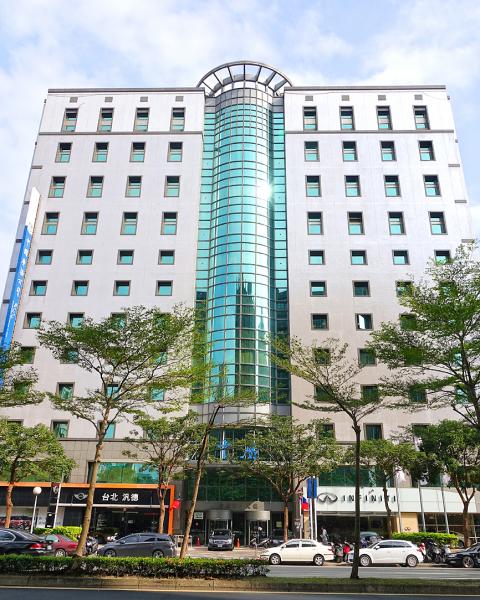The Chinese Nationalist Party (KMT) made NT$7.6 billion (US$238.07 million) by selling the Broadcasting Corp of China (BCC, 中廣), the nation’s largest radio operator, but the party could be asked to return the proceeds to the state, the Ill-gotten Party Assets Settlement Committee said yesterday.
The committee combed through a complex transaction history of the BCC spanning more than a decade involving transfer of equity and capital reduction and found that the KMT made about NT$7.6 billion by selling the radio operator, committee spokeswoman Shih Chin-fang (施錦芳) said.
The BCC, founded in 1928 as a broadcasting unit within the KMT, took over Japanese broadcasting facilities and equipment after World War II, and the the KMT held the BCC via party-owned Hua Hsia Investment Holding Co (華夏投資公司).

Photo: Chang Chia-ming, Taipei Times
In 2005, the KMT transferred the equity of Hua Hsia Investment to other two party-owned companies — Central Investment Co (中央投資公司) and Kuanghua Securities Investment and Trust Co (光華證券投信) — and received NT$3.82 billion.
In 2006, Hua Hsia Investment sold the BCC, including its frequencies and buildings, to BCC chairman Jaw Shaw-kong (趙少康) and four radio operators for NT$5.7 billion. However, Jaw and other buyers paid only NT$1 billion to acquire the BCC’s broadcasting facilities, but not its buildings.
The BCC later transferred its real-estate holdings — worth about NT$5.6 billion — to Kuanghua Co amid lawsuits launched by the government against the company over controversial properties the BCC appropriated from the Japanese.
Central Investment Co later acquired Kuanghua Co and transferred the BCC real-estate holdings to Hsinyutai Co (欣裕台股份有限公司, a spin-off of Central Investment Co.
In 2012, Kuanghua reduced its capital by NT$800 million and redistributed the money to Hsinyutai, which in turn transferred the money to its sole shareholder, the KMT.
Hsinyutai in 2013 reduced its capital by NT$2 billion and redistributed the money to the KMT.
Last year, Hsinyutai sold its holdings in Kuanghua to another company, Hsinkuanghua Co (欣光華), for NT$3 billion, which later reduced its capital by NT$2.9 billion and redistributed it the KMT.
“In the preparatory hearing on Friday [today], we have to understand whether the BCC and Central Motion Picture Corp (CMPC, 中央電影公司) were directly controlled by the KMT to determine whether they were KMT-affiliated organizations,” Shih said.
KMT Culture and Communications Committee deputy director Hu Wen-chi (胡文琦) said all the data revealed by Shih were investigated by prosecutors during former president Chen Shiu-bian’s (陳水扁) administration and no evidence of illegal activity between the BCC and the KMT was found.
The BCC has already returned controversial properties to the government, including those in Changhua and Hualien counties, as well as New Taipei City’s Banciao (板橋) and Bali (八里) districts, Hu said.
He called on the Ill-gotten Party Assets Settlement Committee to investigate former president Lee Teng-hui (李登輝), former KMT treasurer Liu Tai-ying (劉泰英) and People First Party Chairman James Soong (宋楚瑜), who Hu said were involved in the BCC’s financial management and investments, but were not included in the investigations.

MAKING WAVES: China’s maritime militia could become a nontraditional threat in war, clogging up shipping lanes to prevent US or Japanese intervention, a report said About 1,900 Chinese ships flying flags of convenience and fishing vessels that participated in China’s military exercises around Taiwan last month and in January last year have been listed for monitoring, Coast Guard Administration (CGA) Deputy Director-General Hsieh Ching-chin (謝慶欽) said yesterday. Following amendments to the Commercial Port Act (商港法) and the Law of Ships (船舶法) last month, the CGA can designate possible berthing areas or deny ports of call for vessels suspected of loitering around areas where undersea cables can be accessed, Oceans Affairs Council Minister Kuan Bi-ling (管碧玲) said. The list of suspected ships, originally 300, had risen to about

DAREDEVIL: Honnold said it had always been a dream of his to climb Taipei 101, while a Netflix producer said the skyscraper was ‘a real icon of this country’ US climber Alex Honnold yesterday took on Taiwan’s tallest building, becoming the first person to scale Taipei 101 without a rope, harness or safety net. Hundreds of spectators gathered at the base of the 101-story skyscraper to watch Honnold, 40, embark on his daredevil feat, which was also broadcast live on Netflix. Dressed in a red T-shirt and yellow custom-made climbing shoes, Honnold swiftly moved up the southeast face of the glass and steel building. At one point, he stepped onto a platform midway up to wave down at fans and onlookers who were taking photos. People watching from inside

Japan’s strategic alliance with the US would collapse if Tokyo were to turn away from a conflict in Taiwan, Japanese Prime Minister Sanae Takaichi said yesterday, but distanced herself from previous comments that suggested a possible military response in such an event. Takaichi expressed her latest views on a nationally broadcast TV program late on Monday, where an opposition party leader criticized her for igniting tensions with China with the earlier remarks. Ties between Japan and China have sunk to the worst level in years after Takaichi said in November that a hypothetical Chinese attack on Taiwan could bring about a Japanese

The WHO ignored early COVID-19 warnings from Taiwan, US Deputy Secretary of Health and Human Services Jim O’Neill said on Friday, as part of justification for Washington withdrawing from the global health body. US Secretary of State Marco Rubio on Thursday said that the US was pulling out of the UN agency, as it failed to fulfill its responsibilities during the COVID-19 pandemic. The WHO “ignored early COVID warnings from Taiwan in 2019 by pretending Taiwan did not exist, O’Neill wrote on X on Friday, Taiwan time. “It ignored rigorous science and promoted lockdowns.” The US will “continue international coordination on infectious